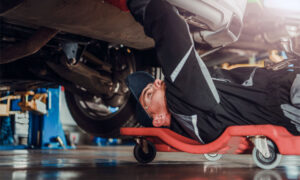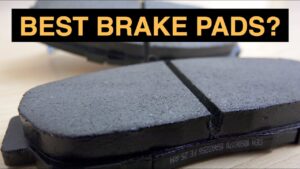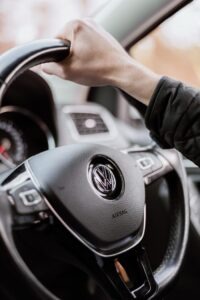We all know that the many parts have to be in contact to run a vehicle. When two materials touch each other for a long time, it starts to wear out due to friction. The worn-out parts will start to produce noises and weird sounds. It is an indication to repair or replace the respective component before it ends worse. Every unusual sound links with specific problems, so you must be clear about which part is causing the problem.
For instance, consider brakes, the parts of brakes gets in contact with the wheel most of the time, which makes it the fastest and quickest worn-out part in the car. The person can notice the brakes grinding when driving, which means you must repair it soon. Check out this article to learn about what causes it and fix it now.

Table of Contents
Driving With A Grinding Brakes
It is necessary to drive with good functioning brakes because it is essential to slow and stop vehicles wherever required. If the brake pads don’t engage with the rotor in the wheel, the car will not stop even if the brakes are applied. In this case, the pads are not in perfect contact with the rotor, therefore causing grinding noises when braking. The grinding of brakes will wear it out more leading to failure of brakes. Driving with worn-out grinding brakes increases the risk of accidents that could end worse. So, if you notice the brakes grinding when driving, then inspect the brakes and fix them immediately to avoid accidents.
What Causes Grinding Of Brakes?
Some common reasons might grind your brakes quicker than usual. If you experience the same issue, then these might be the causes for it.
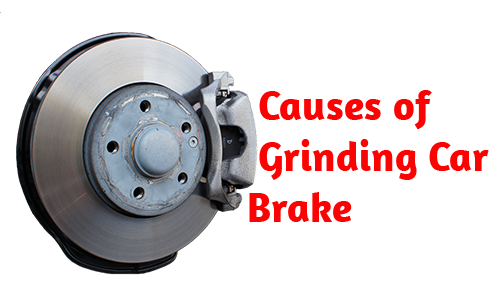
1. Improper Maintenance
The vehicle should be serviced and maintained regularly to avoid such issues. If you haven’t used your car for a long time, then your parts in the vehicle will be jammed or stiff, and your lubricants would have lost their ability for proper function. The brakes might be stuck in their position or to the rotor and cause grinding if you drive the vehicle. Driving with this condition has the risk of brake failure or damage. Check the state of the components if you are using your car after a long time.
2. Worn-out Rotor
The rotor blades have an average life span of duration for 20000 miles. Sometimes they wear out sooner if you use the brakes often when there is no need for it. The worn-out rotor will never get in contact with the brake pads correctly and leads to brake failure. The friction between the rotor and the brake pads is more when driving, souse the brake only when necessary and avoid driving with brakes pressed.
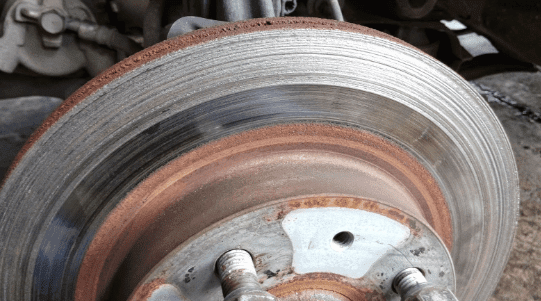
3. Bad Brake Pads
The brake pads are located on the rims of the wheel and controlled by the brake pedal. When brakes are applied, the brake pads get in contact with the rotor and stop the rotation respectively. If the brake pads are rough and bad, then it damages the rotor when gets in touch and also cause grinding noises. Check the condition of the brake pads regularly and replace them if required.
Also, use the brake pads that suit and are suggested for your vehicle. Using a cheap or different brake pad will affect the entire system and causes trouble sooner than usual. Always use the spares that are specified and designed for your vehicle. Do not compensate for the standard and quality.

4. Dirt In The Brakes
Any abrasive or impurities in the brake system will affect its function. The impurities enter the wheel system because of the direct exposure to the terrains. There are more chances that this dirt will get in the rotor and braking systems. The impurities and abrasives in between the rotor and brake pads will grind the brakes whenever pressed. Try to clean the system periodically; otherwise, the brakes will be grinding eventually.
5. Insufficient Lubricants
The brakes will function effectively with the help of braking lubricants. Refill the brake fluid every time whenever required for proper functioning. Check the reservoir periodically for the level of oil and maintain it at an individual level. There is a variety of standard fluids available in the market, so choose the specified standard for your vehicle for proper functioning. Do not drive with an insufficient lubricant because this might increase the chances of brakes grinding when driving.

6. Damaged Wheel Bearing
The wheel bearing in the center connects the wheel and the axle. A damaged wheel bearing will cause braking issues. It affects the effect of braking, which in turn grinds the brakes instead of stopping the vehicle. A bad wheel bearing will produce noise indicating the malfunction. The person has to check the bearing and other related parts and replace it if required.
How To Reduce Brakes Grinding While Driving?
The brakes will grind eventually over time, but the usage is the factor that determines its life. Every people will apply the brake whenever required, but some people press the brake every time without the need for it. Also, braking gradually instead of sudden force will allow the brakes to function to their extent, therefore increasing their lifespan. Bad functioning brakes will produce unusual noises.
If you notice such noises, then inspect the brake system and fix it accordingly. Please do not ignore any unusual sounds from the vehicle because it ends worse.
Frequently asked Questions-
Here are some of the frequently asked questions about why do brake pads keep breaking, what happens if your brake fluid is low etc?-
Is It Safe To Drive A Car With Grinding Brakes?
It’s not safe. Driving on grinding brakes will only make the issue worse and increase the cost of repair. It’s always a good idea to get your car serviced and fixed when you notice an issue with its brakes or any other part.
What Should You Do When Your Brakes Make A Grinding Noise?
The best course of action would be to pull over and wait for the brake temperatures to lower. When you hear a grinding noise coming from your car’s brakes, you should refrain from using it and contact a certified mechanic as soon as possible.
Why Do My Brake Pads Keep Breaking?
Damage to the brake pads is caused by constant contact with the rotors and caliper. The backing plate may also come into contact with your brake pad, which also causes considerable damage over time. Grinding or squeaking noises are signs of worn-out pads. It’s one of the most common reasons for those sounds.
What Happens If Your Brake Fluid Is Low?
unlike your engine where the fluid is a lubricant, in your brakes, the fluid is a hydraulic fluid. So it’s not catastrophic destruction when it’s low, just needs to be properly maintained and you’re back on the road.
What Happens If You Over Lubricate Your Brakes?
Over lubrication of the brakes results in lubricant dripping or spraying into places where it’s undesirable, and could reduce the effectiveness of the brakes.
What Kind Of Fluid Do You Use To Lubricate Brake Calipers?
For lubricating hydraulic components, such as the piston seals inside calipers and wheel cylinders, you can use a silicone-based brake lubricant or ordinary brake fluid. This type of lubricant will help assure smooth movement of the seals in their bores and will help prevent these parts from sticking or corroding.
Conclusion
Every part of the car will wear out over time, but it depends on the usage and duration of functioning. Some parts wear out sooner than others, which means it often functions under more friction than others. One such component in the car is the brakes. It should work adequately for an effective response.
If not, then the person can notice the brakes grinding while driving. It is recommended not to drive with bad brakes, so never let it stop you from enjoying your drive and replace it sooner.
Follow us and have an update on all such similar contents and issues of your day-to-day life. Also, share your suggestions and queries in the comment box below so that we can assist you.
![You are currently viewing Your Brakes Grinding When Driving? [Reasons & Solutions]](https://hydraulicsuspension.com/wp-content/uploads/2021/04/Depositphotos_71936277_xl-2015.jpg)
